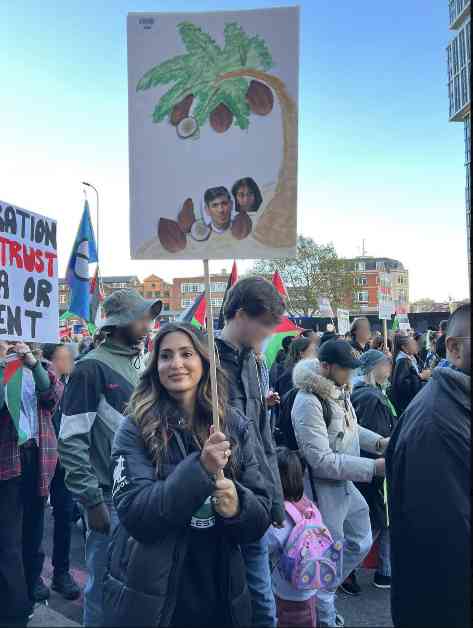Hundreds of people gathered outside Westminister Magistrates’ Court in London to protest the start of the trial of Marieha Hussain, a British Asian woman charged with a hate crime over a satirical placard she carried at a pro-Palestine demonstration last November. The placard depicted then Prime Minister Rishi Sunak and former Home Secretary Suella Braverman as coconuts, leading to her being charged with a racially aggravated public order offence.
### Protesting for Freedom of Speech
The protesters argued that Hussain’s actions were a legitimate form of criticizing right-wing politicians and that the term “coconut” is used within Black and Asian communities to describe individuals who are perceived as being sympathetic to racist agendas. They believe that freedom of speech is under attack and that there are limits to what people of color can say without facing legal repercussions.
Dr. Asim Qureshi, the Research Director at Cage, an advocacy group, expressed his disbelief at the case, stating that in his 24 years of work, he had never seen a situation as ridiculous as this one. He highlighted the racialization of freedom of speech in the UK and the double standards faced by people of color when expressing their opinions.
### Standing Up Against Prosecutory Power
Lawyer Shola Mos-Shogbamimu addressed the crowd outside the court, condemning what she saw as an abuse of prosecutory power against Hussain. She questioned why white people were not being prosecuted for similar language and criticized the authorities for using the law meant to protect Black and brown people against them.
This case is part of a larger trend where people of ethnic minority heritage are being investigated for using intra-communal language to criticize public figures. Professor Kehinde Andrews, the UK’s first professor of Black studies, is facing a criminal investigation over a video where he referred to conservative commentator Calvin Robinson as a derogatory term. The authorities’ response to such incidents has raised concerns about the limits of freedom of speech for people of color.
### The Legal Battle Begins
Inside the court, Hussain pleaded not guilty to the racially aggravated public order offence. The prosecution argued that the term “coconut” was a well-known racial slur with a clear meaning, while the defense maintained that the placard was a political criticism rather than an abusive statement.
Rajiv Menon KC, representing Hussain, described the placard as a humorous and satirical expression of political dissent. He emphasized that the image was hand-drawn and not meant to incite hatred or violence. Hussain’s prepared statement reiterated that her intention was to oppose the government’s policies and not to spread hate or discrimination.
Metropolitan Police communications manager Chris Humphreys testified that the police became aware of the placard through social media posts and actively monitored accounts that frequently shared protest-related content. The defense questioned the source of the image, pointing out that it was posted by a politically motivated blog with ties to opposing criticism of the Israeli state.
### Defending the Right to Speak
Professor Kehinde Andrews, speaking at the protest outside the court, emphasized the importance of defending the right to speak freely, especially when challenging uncomfortable or controversial issues. He criticized the authorities for selectively enforcing laws against anti-racism activists and called for greater protection of freedom of expression for all individuals.
The trial of Marieha Hussain highlights the complex dynamics of freedom of speech, racial politics, and public discourse in the UK. As the case continues, it raises important questions about the limits of expression, the role of satire in political criticism, and the protection of marginalized voices in society. The outcome of this trial will have far-reaching implications for the future of free speech and activism in the country.












